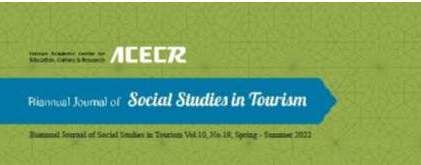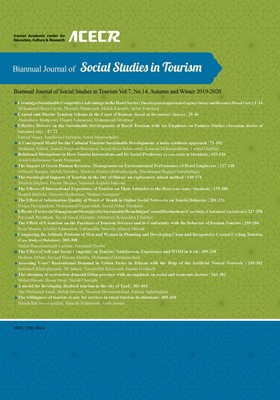Effective Drivers on the Sustainable Development of Rural Tourism with an Emphasis on Futures Studies (Awraman district of Sarvabad city)
Subject Areas :1 * , رسول صفیاری 2 , soran manoochehri 3
1 -
2 -
3 -
Keywords: sustainable tourism development, future studies, drivers, Awraman district of Sarvabad city,
Abstract :
Sustainable development of tourism requires a future studies approach. Given the nature of sustainability and the complexity of the open tourism system and its impact from trends, events, and changes (known as drivers), such an approach can identify, understand, and analyze the complexities and the operating drivers. This applied research with a descriptive-analytical method and a prospective exploratory approach identified the most important drivers that would affect the sustainable development of Awraman (Kurdistan, Iran) rural tourism. To identify the drivers, we used the Delphi technique and selected 38 experts. The MicMac software was used to find the relationships and their impacts and effectiveness. The results showed that the tourism system of the region would follow an unstable development. In such a situation, the aggregated drivers of economic, institutional, and environmental indicators would be more effective than social drivers. The most effective driver would be an inappropriate business environment, while a culture of self-employment and entrepreneurship would be the most influential driver in the sustainable development tourism for the region.
ازغندی، علیرضا.(1389). «آینده پژوهشی؛ رهیافتی نو در مدیریت جامع حمل و نقل شهری». فصلنامه مطالعات مدیریت ترافیک. سال پنجم.شماره 16. صص: 99-77.
بهشتی، محمد باقر؛ زالی، نادر. (1389). «شناسایی عوامل کلیدی توسعه منطقه¬ای با رویکرد برنامه¬ریزی منطقه¬ای بر پایه سناریو: مطالعه موردی استان آذربایجان شرقی». فصلنامه برنامه¬ریزی و آمایش فضا. دوره 15. شماره 1.صص:5-41.
تقیلو، علی اکبر. (1392). «سناریوهای آینده سکونتگاه¬های روستایی ایران». مجله پژوهش و برنامه¬ریزی روستایی. سال سوم. شماره پنجم. صص: 96-83.
تقیلو، علی اکبر؛ سلطانی،ناصر؛ آفتاب،احمد. (1395). «پیشران¬های توسعه روستاهای ایران». فصلنامه برنامه¬ریزی و آمایش فضا. دوره 20. شماره 4. صص: 28-1.
تولایی، روح الله. (1393). «آینده پژوهشی روند خدمات مجازی در ایران در فرآیند تکنولوژیک جهانی¬شدن با روش دلفی». فصلنامه راهبردی مطالعات جهانی شدن. سال پنجم. شماره چهاردهم. صص: 122-94.
حبیبی، لیلا ؛ مهرآبادی، مریم. (1389). «آينده پژوهي و آينده کلان شهرها با تاکيد بر کلانشهر تهران». فصلنامه جغرافیایی چشم¬انداز زاگرس. دوره 2. شماره 6. صص: 110-97.
رکن¬الدین افتخاری، عبدالرضا؛ مهدوی، داوود؛ پورطاهری، مهدی. (1389). «ارزیابی پایداری گردشگری در روستاهای تاریخی- فرهنگی ایران با تاکید بر پارادایم توسعه پایدار گردشگری». فصلنامه مطالعات گردشگری. شماره 14. صص:34-1.
رونیزی، سعید رضا.(1395). «سنجش پایداری گردشگری در روستاهای هدف گردشگری (مطالعه موردی شهرستان سپیدان)». فصلنامه پژوهشهای روستایی. دوره 7. شماره 1.صص: 181-167.
زالی، نادر؛ عطریان، فروغ. (1395). «سناریوهای توسعه گردشگری منطقه¬ای بر اساس اصول آینده پژوهشی(مورد مطالعه: استان همدان)». فصلنامه آمایش سرزمین. شماره اول. صص:131-107.
طیب نیا، هادی؛ محمدی، سعدی؛ منوچهری، سوران. (1395). «ارزیابی تاثیرات توسعه گردشگری در تغییرات کیفیت زندگی روستاییان (مطالعه موردی: بخش اورامان سروآباد)». مجله پژوهش و برنامه¬ریزی روستایی. سال 5. شماره 1. صص: 179-163.
عبدالهی، بیان. (1396). «تحلیل و سنجش وضعیت پایداری گردشگری روستایی(مطالعه موردی بخش اورامان شهرستان سروآباد». پایان¬نامه کارشناسی ارشد رشته جغرافیا و برنامه¬ریزی روستایی به راهنمایی دکتر سعدی محمدی، دانشگاه پیام نور.
علی اکبری، اسماعیل؛ پوراحمد، احمد؛ جلال آبادی، لیلا. (1397). «پیشران¬های موثر بر وضعیت آینده گردشگری پایدار شهر کرمان با رویکرد آینده پژوهشی». فصلنامه گردشگری و توسعه. سال هفتم. شماره اول. صص:178-156.
فرجی، امین؛ نعمت پور محمد؛ عشریه، امید. (1396). «تحلیل سیستمی اثرات مثبت و منفی توسعه گردشگری ایران با رویکرد آینده پژوهشی». دوفصلنامه اجتماعی گردشگری. سال پنجم. شماره نهم. صص:189-151.
کاظمی، مهدی.(1390). مدیریت گردشگری. تهران: انتشارات سمت.
کروبی، مهدی؛ نجفی، امیرعباس؛ حیدری، مجید. (1391). «آینده پژوهشی رهیافتی نو در توسعه و برنامه¬ریزی گردشگری». اولین همایش ملی آینده پژوهشی. تهران، شرکت یادگار درخشان.
گوهری فر، مصطفی؛ آذر، عادل؛ مشبکی، اصغر. (1394). «آینده پژوهی: ارائه تصویر آینده سازمان با استفاده از رویکرد برنامه¬ریزی سناریو (مورد مطالعه: مرکز آمار ایران)». فصلنامه مدیریت ایران. سال دهم. شماره 38. صص: 65-36.
محمدی، سعدی؛ احمدی، عبدالمجید. (1396). «تحلیل پایداری گردشگری در روستای اورامان تخت شهرستان سروآباد». فصلنامه اقتصاد فضا و توسعه روستایی. دوره 6. شماره 21. صص:100-81.
مظفری، علی. (1389). «آینده¬پژوهشی، بستر عبور از مرزهای دانش». فصلنامه نظم و امنیت انتظامی. شماره چهارم. سال دوم. صص: 46-25.
ملک¬زاده، ندا؛ بزاززاده، مهدی؛ رفیعیان، مجتبی. (1395). «شناسایی و تحلیل عوامل کلیدی موثر بر توسعه گردشگری شهری با رویکرد آینده نگاری (مطالعه موردی: کلان شهر کرج)». فصلنامه جغرافیا و توسه شهری. دوره 4. شماره 2. صص: 52-35.
نعیمی، کیومرث؛ پورمحمدی، محمدرضا. (1395). «شناسایی عوامل کلیدی موثر بر وضعیت آینده سکونتگاه¬های فرودست شهری سنندج با تاکید بر کاربرد آینده پژوهشی». فصلنامه مطالعات شهری. شماره 20. صص: 62-52.
Asan,U., seda, S., & Asan,S.(2007). Qualitative cross-impact analysis with time consideration. Technological Forecasting and Social Change. 74(5) ,pp 627-644.
Awedyk, M., & Niezgoda, A.(2016). New opportunities for future tourism after 25 years of political and socioeconomic transformation – foresight in Poland’s tourism planning. Journal of tourism futures. 2(2), 137-154.
Baudment, F. G.(2011).Designing a foresight exercise for the future of rural communities in Romania. journal of Futures. 43(9), 996-1008.
Dabour, N.( 2003). Problem and prospect of sustainable tourism development in the oic countries, :eco tourism. Journal of Economic Cooperation Among Islamic Countries.24(1) , 25-62.
Godet,M.(2008). La Prospective Use and Misuse of Scenario Building, Circle of Future Entrepreneurs. Retrieved December 4, 2018 from: http://www.laprospective. fr/dyn/francais/ actualites /SR10v Eng .pdf.
Lanquar, R.(2011).Tourism in the Mediterranean Scenarios up to 2030. MEDPRO (Mediterranean Prospects) project. Report No. 1.European commission European research area. Retrieved July 3, 2018 from: http://aei.pitt.edu/58341/1/MEDPRO_Report_No_1.pdf.
Omran, A.(2014).Structural Analysis with Knowledge-based MICMAC Approach. International Journal of Computer Applications. 86(5), pp31-42.
Sirius, A., Cnam, G., & Cnam, M.(2003). Structural analysis with the MICMAC method & Actors' strategy with MACTOR method. American Council for the United Nations University: The Millennium Project (2003).
Stratigea, A., & Katsoni, V.(2015). A strategic policy scenario analysis framework for the sustainable tourist development of peripheral small island areas – the case of Lefkada-Greece Island. European Journal of Futures Research.3(2),PP2-17.
V.A. Bañuls., & M. Turoff.(2011). Scenario construction via Delphi and cross-impact analysis. Technol. Forecast. Soc. Change. 78(9),pp 1579-1602.
Vinnari, M.(2014). An Introduction to Future Studies Approaches and Foresight, LYY-course. University of Eastern Finland.
Voros. J.(2005). A generic foresight process framework. Journal of Foresight.5(3) , pp 10-21.

